Polling shows Americans noticing price hikes and delivery delays under recent trade changes.
In late August 2025, the Trump administration eliminated the de minimis exemption, ending a policy that had allowed packages valued under $800 to enter the United States duty-free. The change affected up to 4 million packages daily. More than 25 countries temporarily suspended postal deliveries to the United States, citing uncertainty about new tariff procedures. Shipping costs between Shanghai and Los Angeles nearly doubled as importers navigated the policy changes.
Two polls conducted in September and early October 2025, as part of Change Research‘s internal Compass Poll series, which informs the Change Research Data Portal, surveyed registered voters about their experiences with online shopping and trade policy, revealing widespread disruptions to consumer experiences.
Most Shoppers Notice Higher Prices
Nearly half of registered voters report that prices feel higher when shopping online. In the September 5-10 poll, 47% notice higher prices, a figure that holds steady at 47% in the September 28-October 6 poll.
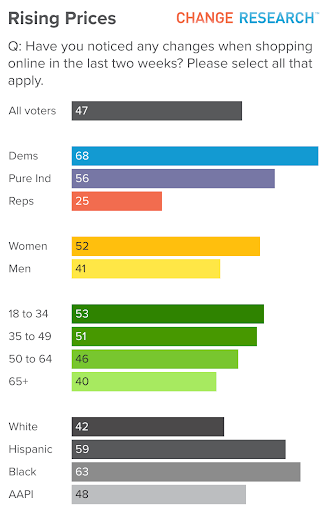
The perception varies sharply by political party. In the September poll, 70% of Democrats report feeling prices are higher compared to 22% of Republicans. The October poll shows similar divisions, with 68% of Democrats and 25% of Republicans reporting higher prices.
Women notice price increases more than men. In the September poll, 52% of women report higher prices compared to 42% of men. The October poll shows 52% of women and 41% of men noticing the same.
Shipping Costs and Delays Mount
About three in ten voters report that shipping costs more. In the September poll, 31% notice higher shipping costs, while 30% report the same in the October poll. Democrats notice higher shipping costs at 46% in September and 43% in October, compared to 14% and 16% of Republicans respectively.
About one in five voters notice slower shipping times. In the September poll, 23% of registered voters report shipping delays, while 21% notice delays in the October poll. Democrats report shipping delays at roughly twice the rate of Republicans in both surveys.

International Shipping Disruptions Create Concern
In the September poll, 55% of registered voters express concern about multiple countries temporarily pausing shipments to the United States due to confusion over new import taxes and tariffs. Democrats express concern at 91% compared to 18% of Republicans.
The concern levels vary significantly by ethnicity. Black voters express the highest concern at 79%, followed by Asian American and Pacific Islander voters at 76% and Hispanic voters at 61%. White voters report 49% concern.
Women express higher levels of concern than men, with 63% of women concerned compared to 47% of men. Younger voters report greater concern, with 66% of voters aged 18 to 34 concerned compared to 48% of those aged 65 and older.
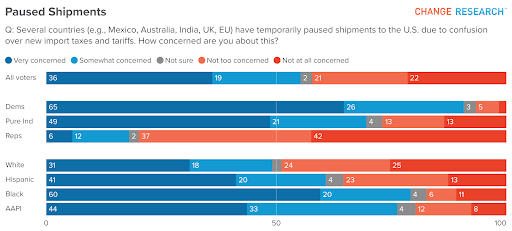
Product Availability Becomes an Issue
Between 17% and 21% of voters report that some sites or products are not available. In the October poll, 17% notice product unavailability, with Democrats reporting this at 24% compared to 9% of Republicans.
Between 16% and 21% of voters report that some places have stopped shipping to the United States. In the September poll, 35% of Democrats notice this compared to 5% of Republicans.
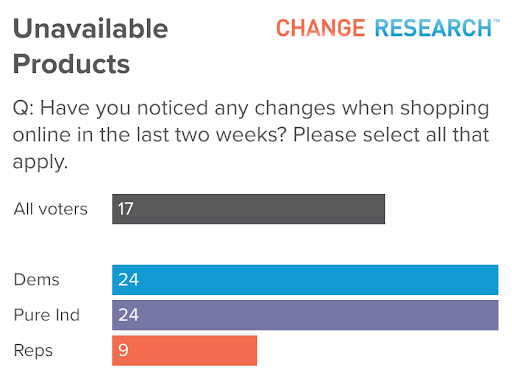
Voters Split on Personal Impact of Tariff Policies
When asked directly about how tariff-focused trade policies affect them personally, voters offer divergent assessments along partisan lines.
In the September poll, 44% of voters say tariff policies are hurting them because everyday purchases are pricier. Democrats report this view at 81%, while 6% of Republicans agree. The October poll shows 49% overall saying tariffs are hurting them, with 87% of Democrats and 9% of Republicans holding this view. Among self-identified MAGA Republicans in October, only 4% say tariffs are hurting them.
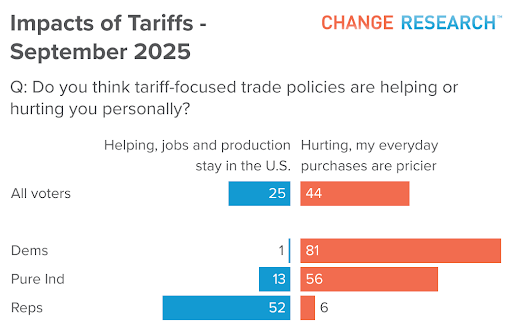
Meanwhile, 25% of voters in the September poll say tariffs are helping by keeping jobs and production in the United States. Republicans express this view at 52%, compared to 1% of Democrats. The October poll shows 14% overall saying tariffs are helping, with 29% of Republicans and 1% of Democrats agreeing. Among MAGA Republicans in October, 37% say tariffs are helping.
About one in five voters say tariff policies have mixed effects, helping manufacturers while raising costs for consumers. In September, 17% express this view, while 19% do so in October. This perspective remains relatively consistent across party lines.
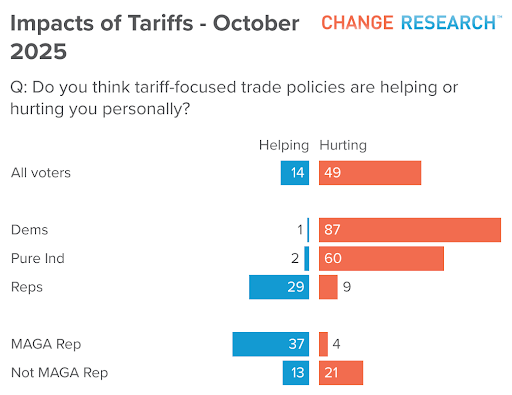
A Nation Experiencing Trade Policy Differently
The polling reveals a striking pattern: Americans are living in substantially different economic realities based on their political affiliation. While nearly half of all voters report noticing higher prices and shipping costs when shopping online, Democrats consistently report these disruptions at two to three times the rate of Republicans across virtually every measure.
This divide extends beyond simple perception. The gap appears in concrete observations about shipping disruptions, product availability, and whether places have stopped shipping to the United States. The partisan difference remains consistent across both the September and October polls, suggesting these are not fleeting reactions but sustained patterns in how Americans experience the same policy environment.
The demographic patterns add additional layers to the story. Women, younger voters, and voters of color report experiencing disruptions at higher rates than men, older voters, and white voters. Black voters in particular express the highest levels of concern about international shipping disruptions at 79%, alongside reporting price increases at 63%.
When voters assess the personal impact of tariff policies, the divide becomes even more pronounced. Democrats overwhelmingly say tariffs are hurting them through higher prices, while Republicans are far more likely to say tariffs are helping by keeping jobs and production domestic. Among the small share of voters who see both benefits and costs, this mixed view crosses party lines more evenly.
The data suggests that partisan identity may shape not just how voters interpret trade policy, but how they perceive and report their day-to-day shopping experiences. Whether voters notice a price increase, a shipping delay, or a product becoming unavailable appears closely tied to their political affiliation, raising questions about how Americans process economic information in an increasingly polarized environment.
Methodology
Change Research conducted the Compass Poll among registered voters online from September 5-10, 2025 and September 28-October 6, 2025. The survey asked respondents about changes they noticed when shopping online and their views on tariff-focused trade policies.
To learn more about Change Research data and insights, visit the Change Research Data Portal. For strategic consultation on polling and public opinion research, book a call with our team.
